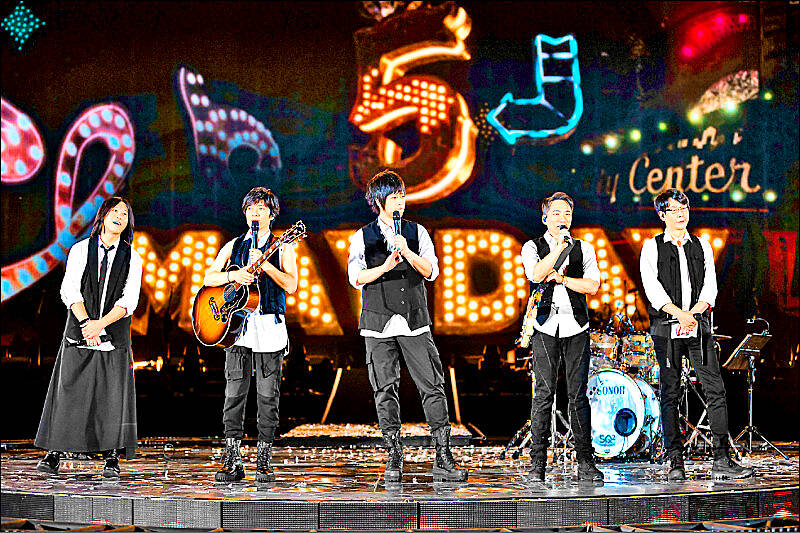China has pressured Taiwanese rock band Mayday to make pro-China comments ahead of next month’s elections, according to sources with direct knowledge of the situation and a security note reviewed by Reuters.
The Chinese National Radio and Television Administration had asked Mayday to publicly voice support for Beijing’s claims that Taiwan is part of China and to join China’s “media propaganda on Taiwan,” an internal Taiwanese security note says.
The note from earlier this month cited intelligence on Chinese government activities gathered by Taiwanese authorities.

Photo courtesy of B’in Music
Mayday is among the most successful Taiwanese bands in China, a market that has become increasingly challenging for Taiwanese celebrities as Beijing steps up its political pressure to assert its sovereignty claims.
Two Taiwanese security officials looking into the matter said that to pressure the rock stars, Chinese authorities earlier this month announced an investigation into Mayday, following allegations on Chinese social media that the band had lip-synched during one of their concerts in China.
Mayday’s management company, B’in Music, did not respond to requests for comment.
B’in Music has previously denied allegations of lip-synching during the band’s tour last month in China, where the practice is prohibited.
The Chinese Publicity Department, which oversees the radio and television administration, and China’s Taiwan Affairs Office said it is “fake news from start to finish.”
A source with direct knowledge of the situation, who requested anonymity, said that Chinese authorities asked the band to provide unspecified “political service,” but the rock stars did not agree to the request.
In response, authorities threatened the band with the lip-synching probe and a fine, the person said.
“They will have to pay if they do not cooperate,” the person said.
The investigation’s findings and any penalties for Mayday have not yet been made public.
The two Taiwanese officials said the campaign was led by the publicity department in a move to sway voters ahead of the Jan. 13 presidential and legislative elections.
By doing so, Chinese authorities believe they could “sway the youth vote in Taiwan,” one of the officials said.
They described the scale of the cross-department campaign against Mayday as “unprecedented,” which involved coverage on the lip-synching allegations by the People’s Daily, state broadcaster China Central Television and Xinhua news agency.
Straits Exchange Foundation spokeswoman Tsai Meng-chun (蔡孟君) yesterday said that the foundation is “extremely unhappy” that anyone engaging across the Taiwan Strait would be subject to political pressure, adding that such actions are detrimental to cross-strait exchanges.
Vincent Chao (趙怡翔), spokesman for the Democratic Progressive Party’s presidential candidate, Vice President William Lai (賴清德), said that China does not even spare musicians.
As election day approaches, Chinese interference is to intensify, he said, calling on the opposition to stand together in condemnation.
Chinese Nationalist Party (KMT) presidential campaign spokesperson Wang Ming-hsu (王敏旭) said the campaign “strongly condemns” China’s behavior, if it is true, and called on Chinese authorities to clarify the matter.
Mayday is a band enjoyed by Mandarin speakers across generations, Wang said, adding that China should not force musicians or artists to express a political stance.
Tai Yu-wen (戴于文), spokesperson for the Taiwan People’s Party campaign, agreed that politics should not interfere with culture, and condemned Chinese election interference as not conducive to cross-strait exchanges.
Additional reporting by Chen Yu-fu, Chen Yun, Hsu Chuo-hsun and Huang Ching-hsuan

Eight restaurants in Taiwan yesterday secured a one-star rating from the Michelin Guide Taiwan for the first time, while three one-star restaurants from last year’s edition were promoted to two stars. Forty-three restaurants were awarded one star this year, including 34 in Taipei, five in Taichung and four in Kaohsiung. Hosu (好嶼), Chuan Ya (川雅), Sushi Kajin (鮨嘉仁), aMaze (心宴), La Vie by Thomas Buhner, Yuan Yi (元一) and Frassi in Taipei and Front House (方蒔) in Kaohsiung received a one-star rating for the first time. Hosu is known for innovative Taiwanese dishes, while Chuan Ya serves Sichuan cuisine and aMaze specializes

Taitung County is to launch charter flights to Malaysia at the end of this year, after setting up flights to Vietnam and Thailand, the Taitung County Government said yesterday. The new charter flight services, provided by low-cost carrier Batik Air Malaysia, would be part of five-day tour packages for visits to Taitung County or Malaysia. The Batik Air charter flight, with about 200 seats, would take Malaysian tourists to Taitung on Dec. 30 and then at 12:35pm return to Kuala Lumpur with Taiwanese tourists. Another charter flight would bring the Taiwanese home on Jan. 3 next year, arriving at 5:30pm, before taking the

Taiwan High Speed Rail Corp. (THSRC) plans to ease strained capacity during peak hours by introducing new fare rules restricting passengers traveling without reserved seats in 2026, company Chairman Shih Che (史哲) said Wednesday. THSRC needs to tackle its capacity issue because there have been several occasions where passengers holding tickets with reserved seats did not make it onto their train in stations packed with individuals traveling without a reserved seat, Shih told reporters in a joint interview in Taipei. Non-reserved seats allow travelers maximum flexibility, but it has led to issues relating to quality of service and safety concerns, especially during

An exhibition celebrating Taiwan and Japan’s comic culture opened on Saturday in Taichung, featuring a section that explores Taiwanese reproductions of Japanese comics from when martial law limited Japanese representation. “A Century of Manga Culture: An Encounter of Taiwan and Japan’s Youth” held its Taiwan opening ceremony at Taichung’s National Taiwan Museum of Comics after an initial one-month run in Japan’s Kyoto International Manga Museum between May 24 and June 24. Much like the Kyoto exhibition, the show mainly celebrates the comic connection between Taiwan and Japan through late Taiwanese comic book